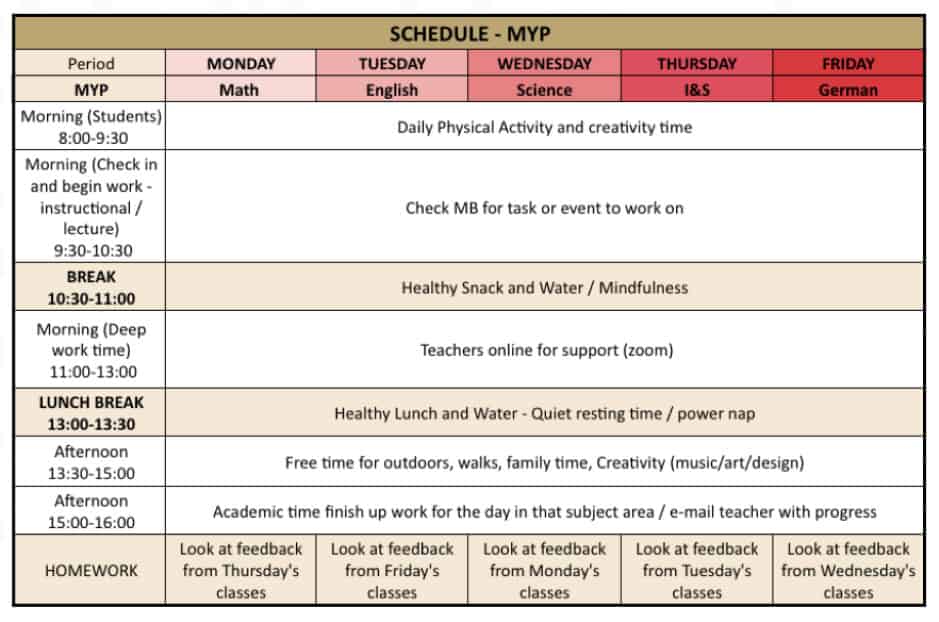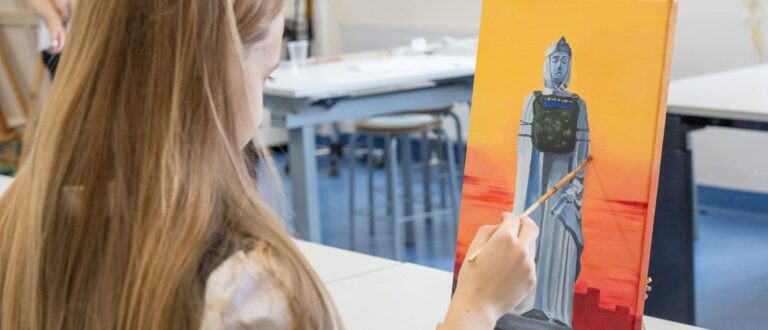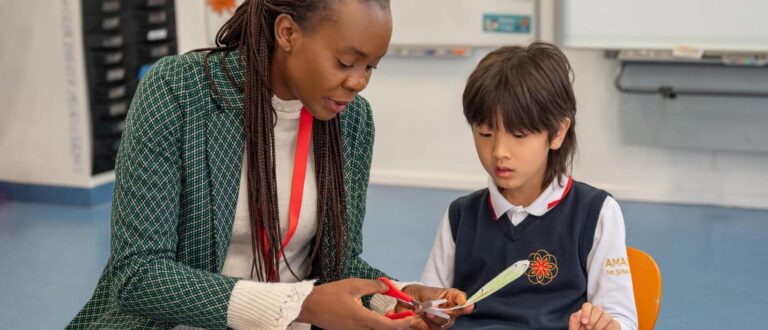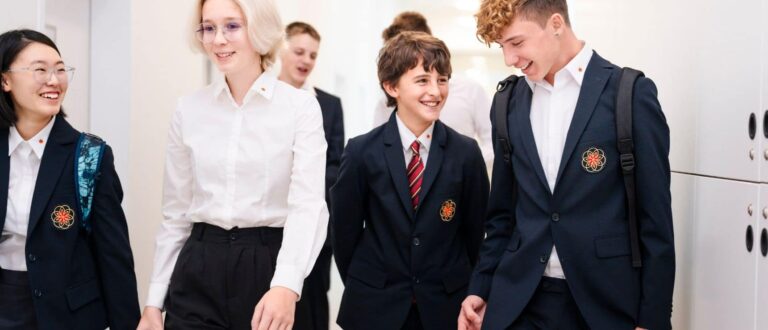It is entirely possible that our students might look back at this world-wide online learning experiment and say it was the most impactful and relevant preparation they received.
At AMADEUS International School Vienna, we are embracing this possibility and continually seeking to level up our performance.
So, what does educational distinction look like in the AV online learning environment? We have engineered our program around the most contemporary educational theory.
It is a very simple schedule based on a complex body of research. Essentially, the days are broken into subject areas whereby every day has a single focus, and the power of the whole department on-hand to support learning. Screen time is limited, and there are movement and creativity breaks, which separate our blocks of ‘deep-learning’. The homework and feedback schedule is spaced in order to allow detailed feedback from teachers and facilitate a positive learning rhythm for better retention. Teacher support time is also scheduled; so help is never more than an e-mail or a video call away.
AV online learning program ensures that our students
- have less screen and sitting time, as wellbeing becomes a priority;
- learn with greater focus due to the more structured blocks of learning and acquisition, and lesser amount of task switching;
- have greater utilization of (and access to) teacher’s skills and knowledge;
- can all access learning and collaborate easily irrespective of their time zone;
- benefit from the latest brain-based research, and study in ways that will optimise their success.
So far, feedback from parents and students has been very positive. Among others, they have commented:
- “They understood our situation well, so they adjusted the way they taught us accordingly”.
- “Teachers use technology to explaining tasks clearly even though we weren’t face to face”.
- “Teachers are there for us when we need help and help us strive for success”.
- “This allows them to give fast and in-depth responses. It is also nice to have an assurance that they (teachers) are online and here to help”

Online Learning Schedule for MYP students at AMADEUS International School Vienna
To provide some additional context to our online learning program we draw upon Roddy & Lodge (2017). They identify four pillars for supporting student success in online learning. These include (i) sense of community, (ii) academic support, (iii) technology support, and (iv) health and wellbeing.
Sense of Community
We start every day with a daily check-in. If this can occur in real-time it is a bonus, but in any case, we start the school day with a check-in activity that is facilitated by the homeroom teacher. Our boarding team also does regular ‘catch-ups’ just to see how things are going.
As each day is structured into key learning areas, we also enable our teachers to develop a greater shared sense of community as they respond to their students’ needs as a team. This adds to the sense of support the students feel as they can touch base during check-in and then work with a single focus in the knowledge that the entire department is there to support. We encourage teachers to set assignments that ask students to work together or that can be combined into something bigger once each student contributes their part. We also encourage the use of google hangouts for the students during their deep-work sessions so that they can support one another in their learning. This technology allows students to hang out virtually and provides an open platform for learning-focused interaction. Students have taken their own initiative to have their lunch breaks together online. Our student council is still having regular zoom meetings to support our AV student community and give feedback on perceptions of the student body.
Academic Support
We believe that the support comes from the community primarily, although there is a significant (not to be underestimated) amount of support that is inherent in the model, the structure of the learning program, and the tools that support it.
According to Thistoll and Yates (2016), “clear assessment practices, including communication of deadlines and assessment requirements have been found to positively influence student engagement and course completion”. We continue to use the Managebac platform for posting all student work and deadlines. Three former IB students created Managebac and we feel it is an excellent way for students to get an overview of all work and assignments and keep structure in the learning program in a familiar way.
Furthermore, we have integrated the principle of spaced repetition into the timetable. “Hundreds of studies in cognitive and educational psychology have demonstrated that spacing out repeated encounters with the material over time produces superior long-term learning, compared with repetitions that are massed together” (Kang, Sean H. K., 2016). We have a learning rhythm, which enables deep-work, followed by review, and consolidation two days later. This is repeated for each key subject area, which gives teachers the time and space to provide detailed and personalised feedback. This structure also ensures that there is sufficient time for focused attention (time to go deeper and follow one’s curiosities) and meaning-making (teachers tie learning outcomes to relevant and engaging global, local, or personal contexts), all of which we know are essential aspects of the brain-based research into the learning process.
Researchers have found that teachers who implement brain-based learning often see both increased knowledge retention and academic performance (Edelenbosch, 2015). Varghese and Pandya (2016) also state that “that brain-based learning as self-perpetuating neurocognitive approaches towards, unadulterated joys of learning which results in ‘learning celebrations’. Hence the researcher recommends the intensive application of this approach for the effective transactions”. Our systems are guided by and seek to replicate these principles online.
The research asserts that brain- based learning as self-perpetuating neurocognitive approaches towards, unadulterated joys of learning which results in ‘learning celebrations’. Hence the researcher recommends the intensive application of this approach for the effective classroom transactions. The research asserts that brain- based learning as self-perpetuating neurocognitive approaches towards, unadulterated joys of learning which results in ‘learning celebrations’. Hence the researcher recommends the intensive application of this approach for the effective classroom transactions.
Technology Support
Educational Technology (EdTech) support, was a major focus in our changes. Our parent and student survey, although very positive, included comments such as “perhaps give us one or two project/s to work on for the week, instead of a new one every lesson” and “back to back deadlines are a little complicated to manage”. We took this information and developed a timetable with less screen time but more support for students. We now have virtual ‘office hours’ where students can get the help they need from their teachers relating to their tasks. We have had great success with Zoom online sessions, seesaw and Managebac. Students have created great submissions to demonstrate learning by using Gsuite, screencastify and iMovie. Our EdTech Coordinator also gives online tutorials to students to answer any tech questions or to explain new and different ways to create digital work.
Health and Wellbeing
The cornerstone of our new program is wellbeing. One cannot sustain high-performance learning without health and wellbeing. We have integrated daily physical activity into our schedule to enable the continued development of physical literacy (Durden-Myers, Whitehead, & Pot, 2018) and have continued to make space for our mindfulness curriculum (the effectiveness of online mindfulness interventions is well documented in studies such as Bailey et al. 2018).
We have also introduced creativity breaks to reenergize students. Although parents and students were extremely happy with our first week online, feedback showed us that students were at risk for too much screen time. We try to limit this to no more than four hours per day. We believe that our job at AV is to develop well-balanced, healthy and imaginative students and our new timetable reflects this.
Finally, we are also offering online counseling to students and/or parents who are requiring some additional support during these times. These sessions can target a range of factors to support ‘academic resilience’, including those 5 Cs proposed in the work of Martin & Marsh (2006); “confidence (self-efficacy), coordination (planning), control, composure (anxiety), and commitment (persistence).” Within this support, our counselor is also sending out daily mindfulness activities and videos to encourage and further lift the spirits of our secondary students.
At AMADEUS has taken the first steps to create a student-based learning schedule that not only empowers and enables students to be successful during this time of distance learning, but builds new learning skills and potential for what might be a new frontiers of learning.
By Karen Ball (Head of Secondary) & Jeremy House (Head of School).







